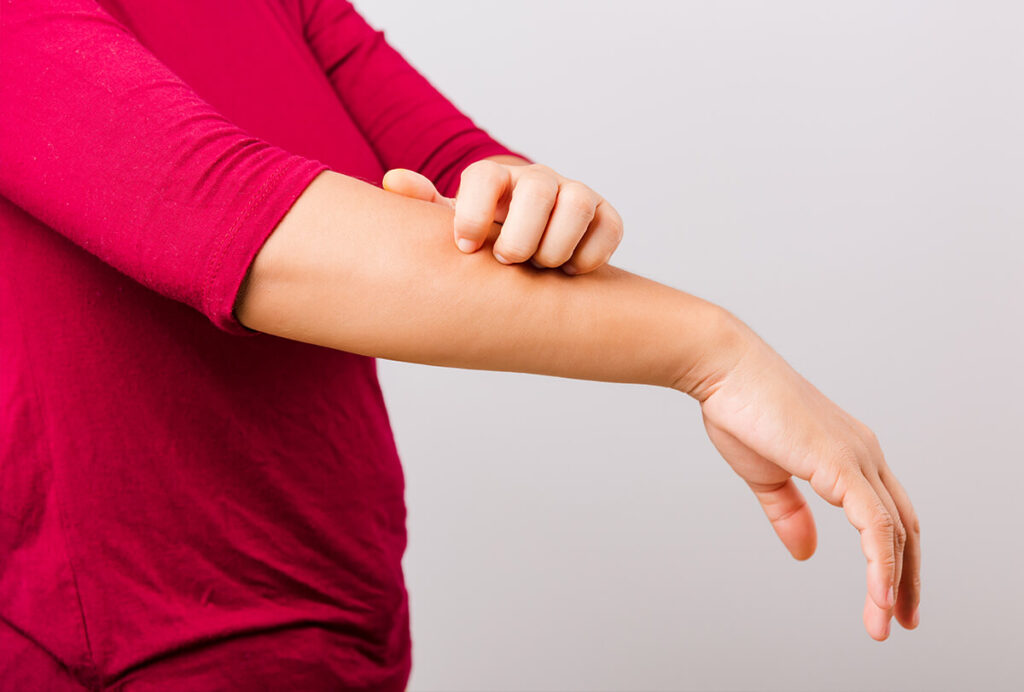
Having itchy skin can be a frustrating and upsetting experience: whether you have a rash or not, your skin is trying to tell you something, but it can’t quite express itself.
What’s worse? Scratching (and the inflammation that results from it) can make you feel even more uncomfortable, and there can be many causes for your itchiness.
Nevertheless, it is best to understand why your itchy skin (medically known as chronic pruritus) is so unbearable in the first place in order to be able to treat it effectively.
Having a problem with itchy skin? Not sure what might be causing it? Dermatologists list 5 of the most common causes of acne on their list of 5 of the most common acne causes.
1) Skin That Feels Dry
It is a common complaint that skin becomes dry or xerosis. When a person’s skin loses moisture, it can start to feel itchy and irritated.
It may also appear flaky and scaly when the skin is dry. Again, people who are older are more likely to experience this, especially when the cold weather sets in.
You can alleviate your dry skin by following these tips that can help prevent it from drying out further:
- It’s best to avoid soaps that contain harsh chemicals because these can cause your skin to dry out. Instead of using perfumed and scented soaps and skin care products, it is better to use hypoallergenic and fragrance-free soaps.
- It is also good to use a home humidifier to add humidity to the air. By doing this, you can prevent dry skin caused by winter.
- Make sure that you moisturize your skin regularly, especially after you get out of the shower. They are popular choices if you are looking for a durable cream such as Vaseline, Vanicream, or Craves.
- If possible, do not take showers that are longer than 10 minutes. Moreover, ensure you use lukewarm water instead of hot water when you shower.
- Also, refrain from taking a bath more than once a day.
- Make sure you keep your skin dry by avoiding scratching it, as it can damage its surface. People who break the skin are more likely to experience scarring and infection as a result of the break.
2) Bite Marks:
When mosquitoes, spiders, or other bugs bite you, the skin around the bite can become itchy and irritated.
When a bug bites you, you may find that you have a very small hole or a pinprick-like area on your skin. However, they can be so small that one might experience itching without being able to see the actual bites because they can be so small.
There are many different types of bugs that can bite a person, including bed bugs, mosquitoes, and lice, and the treatments can vary depending on the type of bug that bit the person.
They should consult their physician whenever a person experiences continued itching following a bug bite or bug bites.
It is recommended that they avoid scratching the area, as scratching may exacerbate the itching. Also, avoid over-the-counter topical antibiotics like Neosporin, as some people can develop an allergic reaction to them.
3) Associated Side Effects
One of the most common side effects associated with many medications is itchy skin. It may occur with or without rashes. However, not everyone who takes these medications will experience these side effects.
Here are some medications that can cause itching of the skin as a possible side effect:
- There are a number of prescription pain relievers that fall into the opioid category, such as acetaminophen, morphine, and fentanyl.
- among others, medications that lower blood pressure
Whenever a person suspects a medication is causing them to itch, they should speak with a doctor before stopping the medication. It is best to consult your doctor about the best course of action and alternative medications if necessary.

It may be necessary for a doctor to discontinue treatment to determine whether a medication is causing the itching in the first place. Sometimes, they may recommend that you take diphenhydramine (Benadryl) or hydroxyzine to reduce the itching symptoms.
4) Nervous System Disorders
It is important to understand that nerve disorders are related to the transmission of skin information to the brain. Nerve problems can cause you to feel itchy or experience pains on your skin without actually damaging it. Problems with the nerves cause this.
Some nerve conditions that are related to itching or other sensations on the skin without the skin displaying signs of a rash will cause itching or other sensations on the skin. Some of these conditions include:
- epilepsy
- diabetes
- Postherpetic neuralgia is a shingles complication
Diabetes is a medical condition that can lead to many different skin problems, according to the American Academy of Dermatology. This condition can lead to itching as a complication of diabetic neuropathy, a condition characterized by damage to the nerves caused by diabetes.
The skin can also become itchy due to injuries that cause nerve damage or injuries that affect the nerves. Depending on where the injury occurs, the area that feels itchy will be determined.
The treatment of nerve-related itching depends upon what the underlying cause is. If they suspect they have a nervous system disorder, they should see a physician to learn what is causing their specific symptoms.
5) The Disease Of The Kidneys
Those suffering from kidney disease may suffer from itching without developing a rash in advanced stages. Itching is not well understood as a cause of kidney disease, but scientists believe that a variety of factors influence it.
An individual who is aware that they have kidney problems should see their doctor if they develop itchy skin after learning that they have kidney problems. Upon making the discovery, the doctor will run some tests to determine how well their kidneys are doing.
The patient may have to undergo dialysis depending on the severity of the condition. A kidney transplant is an operation where a doctor uses a machine to act in the place of the kidneys to remove waste products from the blood.
Skin itching caused by kidney disease can be treated with one of several medications prescribed by dermatologists.
Conclusion
It is important for a person to talk to their doctor if they have been using moisturizer, using a humidifier, and doing good skin care routines yet still have itchy skin. There are some underlying causes that might be disturbing.
The majority of cases of itching without rash result from relatively uncommon causes, although there are some that are quite serious.
If you want to find out what the most likely cause of your problem is and determine the best treatment for it, you should speak to your doctor.